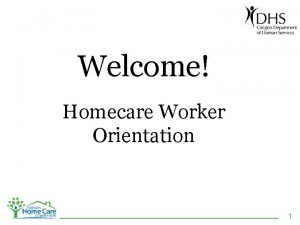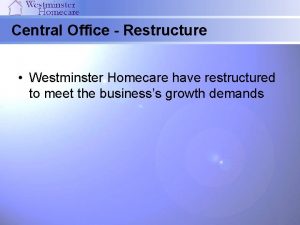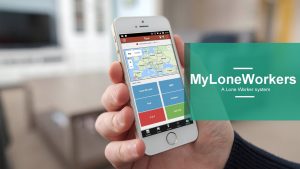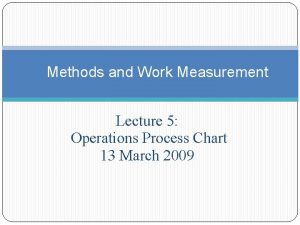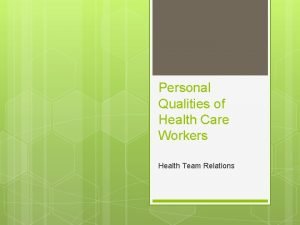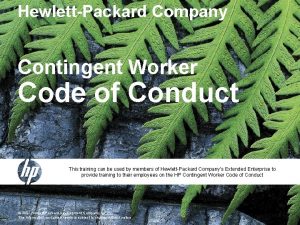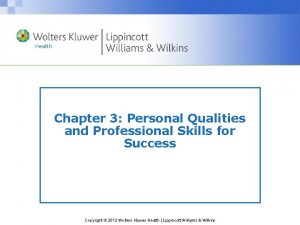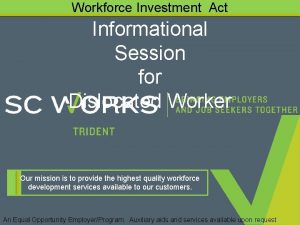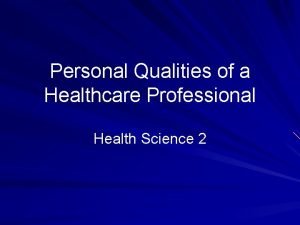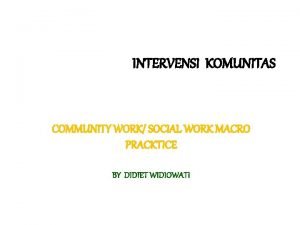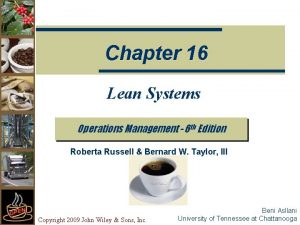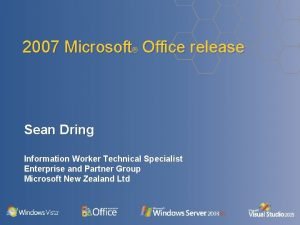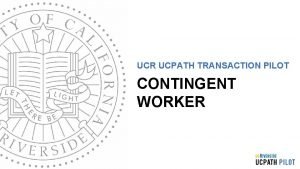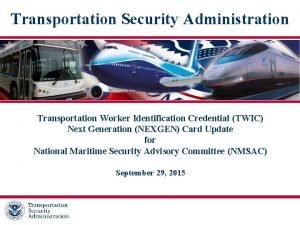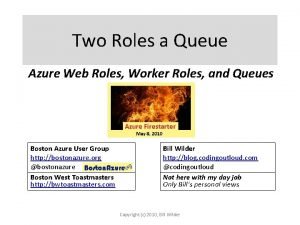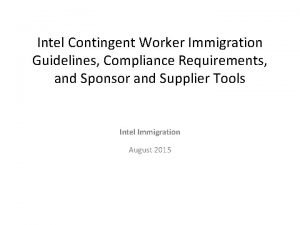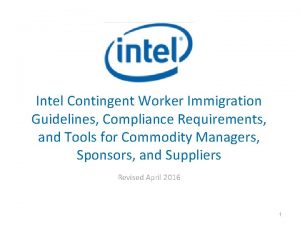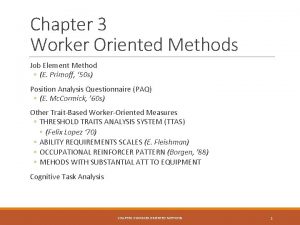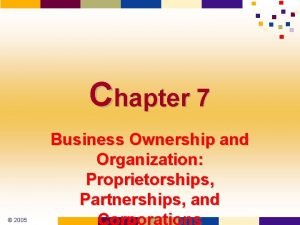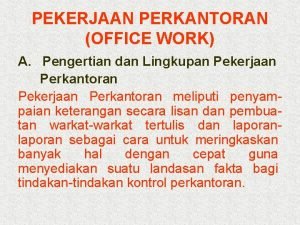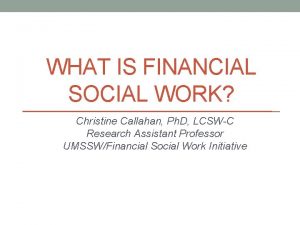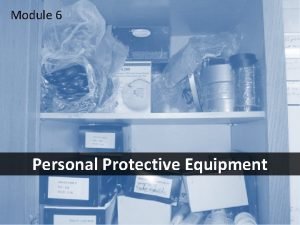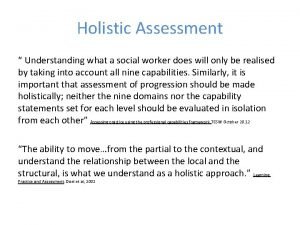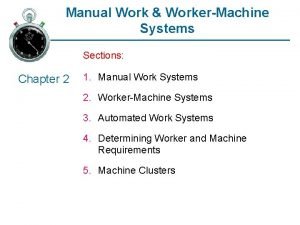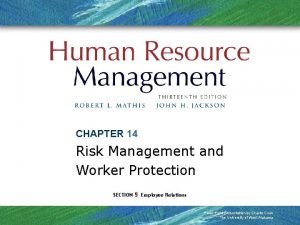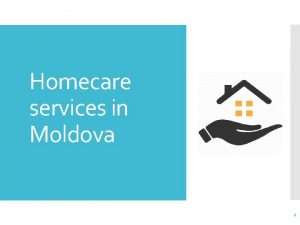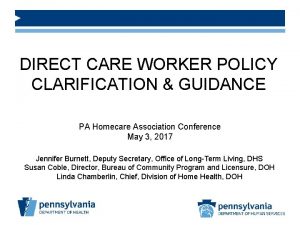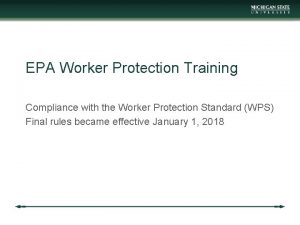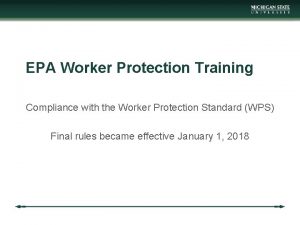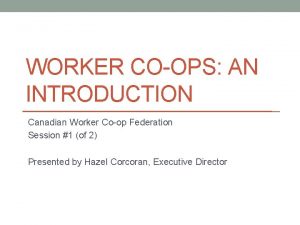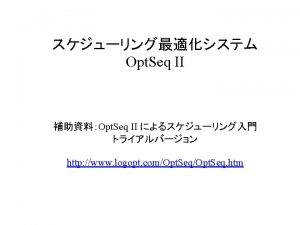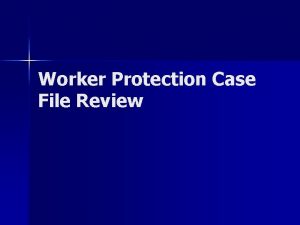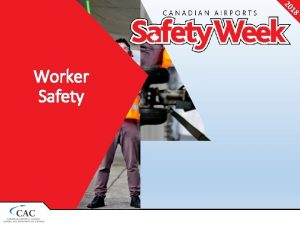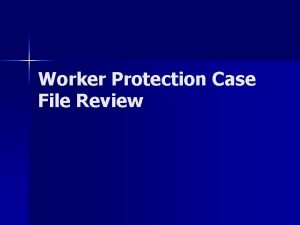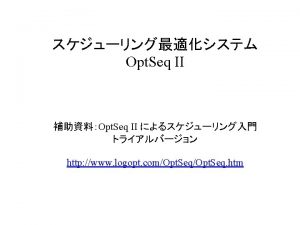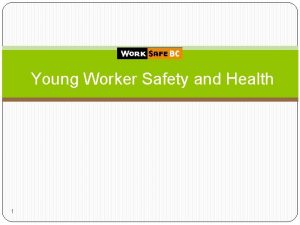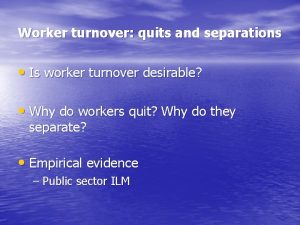Welcome Homecare Worker Orientation 1 What Youll Learn




























































































- Slides: 92

Welcome! Homecare Worker Orientation 1

What You’ll Learn Today • • What HCWs are and what they do How to become a HCW The employment relationship Professionalism: Roles and Expectations What a Task List is How HCWs get paid The travel time policy 2

What You’ll Learn Today • • • Oregon Home Care Commission (OHCC) OHCC Registry and Trainings Confidentiality Mandatory Reporting & Types of abuse Safety and Universal Precautions 3

Why Being a HCW is Important Aging and People with Disabilities’ In. Home services are designed to protect a person’s independence, dignity and choice and enables people to stay at home. YOU are an important part of making that happen! 4

What Does a Homecare Worker Do? HCW Guide Chapter 1 (pgs. 3 -7) 5

Types of Homecare Workers Career HCWs Can work for anyone on an hourly basis who qualifies for Medicaid in-home services. Restricted HCWs Can work on an hourly basis for only one specific consumer. All HCWs are professionals 6

What do I need to know to get started? 7

To enroll, you must: Attend this Orientation and ü Be at least 18 years old ü Fill out an application ü Prove you can legally work in the U. S. (I-9) ü Have a legal name that matches your SSN ü Have an approved background check ü Sign a Provider Enrollment Agreement ü Have the skills, knowledge and ability to work ü Fill out a W-4 for tax withholding 8

HCW Provider Number ü A 6 digit number assigned just to you. ü You cannot be paid as a HCW without having a current, valid provider number. ü It is YOUR responsibility as a HCW to know when your provider number expires and to renew it on time (look on the Registry). ü You must begin the renewal process a minimum of 70 days before your credential expires by contacting the local office. ü If not, there is no guarantee your paperwork will be completed in time and you cannot work and can’t be paid. 9

Medicaid Provider • As a HCW, you are a Medicaid Provider and must follow Medicaid rules. • If you do not, you could: – Not get paid – Lose your provider number – And for fraud and abuse, go to jail • KNOW THE RULES 10

Common Rule Violations You can lose your provider number for: ü Committing abuse; ü Taking or borrowing money or items belonging to your employer. ü Neglecting your employer’s service needs. ü Verbally abusing your employer ü Committing fraud ü Claiming hours not worked. ü Forging a signature or falsifying payment records. ü Working unauthorized overtime. 11

You can lose your provider number for: ü Sharing something that is confidential, even with someone you think you can trust. ü Don’t give someone else your voucher to turn in ü Do not use your voucher for employment verification ü Being intoxicated in the workplace or while working. ü Repeatedly being late or absent from work. 12

Employment Relationship HCW Guide Chapter 2 (pgs. 8 -13) 13

HCWs have a unique employment relationship q Your application and payment records are processed and approved by the local APD/AAA office. q You are employed by the person receiving services (consumer). You are not a state employee. q Your payment is processed and mailed by the State of Oregon. q. To get paid, you must keep your address up-to-date with the local office. 14

Who is your employer? q Your EMPLOYER is the consumer who hires you to work. You may have several employers at one time. q Your employer is NOT your “client. ” § Having a client implies you provide direction. § Having an employer means the individual directs you. q The people receiving services in the in-home program have free choice in managing their lives and making decisions about the services that they receive and who provides them. q Your employer makes decisions on hiring and firing homecare workers. 15

Your Relationship with Your Employer Your employer defines their expectations including; • Your work schedule, time off, and if you’ll be late for work; • Your Task List; • How and when he or she would like a task done; • House rules; • Whether you need training on how to do a specific task; • Any work-related concerns or questions you have; • Signing your voucher AFTER you have worked all your hours; • What do to in an emergency; • Whom you can talk to (i. e. employer’s family; physician; pharmacy, etc. ). 16

When to Contact the Case Manager • • • Changes in your employer’s condition; Questions about the Task List; Concerns about your employer’s well-being; Work concerns you can’t resolve with your employer; Safety issues; Working more hours than authorized due to an emergency; • Issues related to travel time or mileage; • Using paid time off; • When you are no longer working for your employer. 17

Reasons to contact the local office • Changes in your address or telephone number; • To provide an updated copy of your CPR/First Aid card; • Questions about your provider number, credential, or background check status; • Questions about your voucher or payments; 18

Professionalism HCW Guide Chapter 3 (pgs. 14 -22) 19

Be a professional by: • Respecting your employer’s wishes, preferences, beliefs, customs, and routines. • Not assuming you know what’s best for your employer. • Setting and maintaining professional boundaries. • Not oversharing about your personal life. It is NOT professional if you are: – Taking over or being overly involved in your employer’s life. – Making decision for your employer. 20

Be a professional by: • Refusing to break the law or bend the rules. • Not doing special favors, giving gifts, or accepting gifts or money from your employer. • Not borrowing anything from your employer or accepting loans. • Doing what’s right even when no one is looking. • Communicating in a respectful and appropriate manner. • Treating others the way they want to be treated (Platinum Rule). 21

Be a professional by: • Being positive. • Being an adult. • Demonstrating “grace under pressure. ” • Showing up. • Looking like a professional – Wear clean, work appropriate clothing – Have good personal hygiene and grooming habits 22

Service Plan & Task List HCW Guide Chapter 4 (pgs. 23 -29) 23

The Service Plan and Task List When you are hired by a consumer, you will receive a Task List from the case manager. It shows: q How many hours you are hired to work each month. q What types of support you will provide. q Any other specific information needed to do the job. Your employer determines how and when tasks are done. The Task List does NOT authorize you to provide help in the hospital. 24

Unauthorized Services You cannot help with some things because Medicaid will not pay you to do it. This includes, but is not limited to: Yard work Pet care Moving or relocating the consumer/employer Caring for the employer’s children or grandchildren § Services that benefit the entire household (e. g. making family meals, everyone’s laundry, etc. ) § § 25

What You Can Say…. . If asked by your employer to help with something not on your Task List: “I am paid by the state to do certain tasks and I could lose my provider number if I don’t do them or do something that’s not on my Task List. Maybe we should talk to your case manager about this. ” “I’m concerned that I could be injured doing this activity and I’m not covered under my Workers’ Compensation plan if it’s not on my Task List. ” “I’m not sure that is something I can do under the state rules. Let me talk to your CM before I say yes. ” 26

CONSUMER-EMPLOYER NAME Consumer-Employer Address City, State Zip Code CM Name 503 -111 -2222 Medicaid ID 123456 HCW Name Consumer-Employer Name 27

Consumer-Employer Name Consumer-Employer Address City, State Zip Code Medicaid ID CM Name 503 -111 -2222 Consumer-Employer Name 28

Payment for Services HCW Guide Chapter 5 (pgs. 30 -33) 29

Important Note: Before you start working with a consumer Confirm that your credential (e. g. background check) and provider # are active and valid AND You are authorized to work OR You may not get paid! DO NOT WORK UNTIL YOU HAVE THE PROVIDER NUMBER AND THE VOUCHER. 30

Registry – Credential Information 31

Payment Information Work week = 12: 00 AM Sunday through 11: 59 PM Saturday CONSUMER-EMPLOYER NAME HCW NAME PRIME ID HCW # CASE MANAGER NAME 32

Payment Information Signing you worked hours/days you didn’t is Medicaid Fraud and is a crime. You may NEVER sign as the Employer 33

Payment Information Use the following steps to make sure that you receive your correct paycheck in a timely manner: 1. Once your employer has hired you and notified the case manager, you will receive a payment voucher. 2. Know how many hours you have for the pay period and schedule your work to stay within the authorized hours. 3. Make sure all the fields are completed (date; a. m. ; p. m. ; time in/out. 4. Write legibly (if it can’t be read, it will be returned to you to fix which will delay your pay). 5. DO NOT MAKE ANY CHANGES TO THE PRE-PRINTED FIELDS 34

Payment Information 5. Verify that the days and time worked are accurate. 6. After you have completed all service hours for the pay period, have your employer sign it. Do not ask the employer to sign a blank or incomplete voucher. 7. Then you sign it and mail it or drop it off at the local APD/AAA office. 8. Make sure you have provided the most current mailing address. 9. Any errors on the voucher may result in delays in being paid. 35

Payment Information 10. HCWs are not allowed to provide group services (claiming hours for doing the same task for multiple consumers at the same time). Examples: taking all your consumers’ laundry home to launder at the same time; shopping for all your consumers’ groceries during the same shopping trip. All tasks for different consumer-employers should be completed separately. 11. If you are an HCW and PSW – you can’t claim hours on your voucher you worked as a PSW and vice versa. Example: As a HCW, you wrote on your voucher you worked Monday from 8: 30 a. m. -10: 30 a. m. and then entered the same date and time in e. XPRS as a PSW. This is Medicaid fraud. 36

Payment Information • If an emergency comes up or you end up substituting for another worker, you must let the CM know within two business days or you will not get paid. • You can only be paid for prior authorized hours 37

Common Voucher Errors • Claiming more hours than you are authorized for payment; • Incomplete information; • Not having the payment voucher signed by you and your employer; • Using a pencil to fill out or sign the payment voucher (ink is required); 38

Common Voucher Errors • Covering mistakes with correction fluid — instead, cross out any mistakes with one line and have your employer initial all corrections; • Entering time incorrectly. Document the actual time you start working and stop working. Do not just write in a standard time; • Mailing or submitting your payment voucher before the last day you worked in the pay period — the payment voucher should be mailed after completion of the service hours for the payment period; 39

Common Voucher Errors • The numbers or writing cannot be read be sure to write clearly; • Claiming more mileage than you are authorized; • Mailing the payment voucher late. 40

Important Notes Overtime: IF you repeatedly work more than 40 hours per week and have not been approved to do so, you provider enrollment can be terminated. Working Extra Hours: IF you work more hours than authorized due to an emergency, you MUST contact the consumer’s case manager within 2 business days. IF you repeatedly turn in vouchers with more hours than authorized, your provider enrollment can be terminated. 41

Vouchers As of 10/1/17, vouchers are issued for a fourteen (14) day period. It starts on a Sunday and ends 14 days later on a Saturday. Follow the Payroll Calendar for: • Voucher submission deadlines - if you miss it, your voucher won’t be paid until the next Pay Day • Pay processing dates 42

Payment Timelines • You must turn in your voucher to the local office no later than close of business on the Wednesday following the end of the two week pay cycle (remember, it ends on a Sunday). This is called the HCW voucher submission deadline. • The pay processing date is eight (8) business days after the HCW voucher submission deadline. If this falls on a holiday or agreed upon office closure, this date will be moved to the next business day. 43

Payment Timelines • Paper paychecks will be issued and mailed no later than eight (8) business days after the HCW submission deadline. Direct deposits will be sent to the HCW’s financial institution on the pay processing date. • If pay processing dates have to be extended because of an unexpected office closure, we will let you know by posting the information on OHCC’s Facebook page. 44

If there is a problem with how you reported your hours on your voucher: • The local office will let you know within 24 hours that you need to fix it – Make sure your contact information is up-to-date. • You will be given the opportunity to correct the voucher before it is processed for payment. Take action as soon as you hear from the local office. Otherwise, your payment may be late. 45

When you get paid: • You will receive a Remittance Advice. Put it somewhere you can easily find it. • Check the remittance advice carefully to make sure it is accurate. • Always read any messages at the bottom of the remittance. They contain important information. 46

More payment issues • Mileage • Tax withholding • Direct deposit • Unemployment § For purposes of unemployment, the State of Oregon represents the employer. 47

If you no longer want to be a HCW: Notify the local APD/AAA office in writing: – The last day you will be providing or had provided services for all consumers. – That you intend to not work with additional consumers in the future. You will be paid on the next regularly scheduled pay date if you turn in a valid voucher. 48

Travel Time HCW Guide Chapter 6 (pgs. 34 -35) 49

Travel Time Policy 1. You can only be paid for travel time if you provide authorized services for more than one employer on the same day. 2. You must be going directly from one job to the next. You do not get paid for traveling to/from your home (even if you and an employer live together). 3. You will be paid for the most direct and reasonable route. 4. If the time took longer than expected, document why it took so long. 50

Travel Time Policy 4. If your mode of transportation is not a personal vehicle, write in the mode of transportation next to “from address. ” 5. Travel must take less than one hour. 6. Travel time can take up to no more than 10% of the total authorized hours you worked during each pay period. 51

Travel Time Policy 7. Travel time must not overlap with hours of care provided to the consumer. 8. You do not receive mileage reimbursement for travel time. 9. Use the travel time tracking sheet to claim travel hours. They can be audited. 10. Time spent on personal business will not be paid. 52

Travel Time Policy 11. You may stop to fill up your gas tank and use the restroom in between consumers’ homes but these are short stops. 12. The Department is not responsible for vehicle damage or personal injury sustained when you use your own person vehicle or community transportation, except as may be covered under workers’ compensation. 53

Travel Time Policy 13. You must provide verification to the local APD/AAA office that your driver’s license and automobile insurance are up-to-date if you will be using your own personal vehicle for authorized transportation. Proof of insurance can be your auto liability insurance identification card, or other document you receive from your insurance company proving you have current insurance coverage. You must provide insurance verification a minimum of every six (6) months, or as frequently as you renew your policy. 54

Travel Time Tracking Sheet Make sure you read this statement carefully before you sign it. If you sign it, but you did not really report actual dates and times, it is considered Medicaid fraud. 55

Travel Time Tracking Sheet HCW # HCW Name 11/24/19 to 12/07/19 11/24/19 Address of Consumer-Employer 1 9: 00 11/24/19 Address of Consumer-Employer 2 9: 30 Use this space to explain longer than normal travel time Prime # can be found on the voucher 56

Maximum Payable Travel Time Calculation Program APD Hours Worked Base Rate Gross Wages $586. 00 Maximum Allowable Travel Time Wages Maximum hours of compensable travel time 40 $14. 65 $586. 00 . 10 $14. 65 ODDS AMH Total Gross Wages $58. 60 4 HCW Travel Time Compensation may not exceed 10% of gross wages for the pay period Use the table above to calculate your Maximum Allowable Travel Time Wages 1. 2. 3. 4. Enter the total hours worked for each program during the pay period (14 days) Multiply the total hours for each pay period by the rate of pay Add up the gross wages under “Total Gross Wages” Multiply the Total Gross Wages by 0. 10 (for 10 %). • This calculation equals the maximum allowable travel time wages for the pay period 5. Divide the maximum allowable wages by the base rate ($14. 65 in 2019 or $15. 00 in 2020) • This calculation equals the maximum hours of compensable travel time for the pay period 57

The Role of the Oregon Home Care Commission HCW Guide Chapter 7 (pgs. 36 -38) 58

The Oregon Home Care Commission’s Role The Oregon Home Care Commission (OHCC) has five major responsibilities when it comes to you and the work you do. The OHCC: • Defines homecare worker qualifications; • Created and maintains a statewide Registry of homecare workers; • Provides training opportunities for homecare workers; • Serves as the “employer of record” for purposes of collective bargaining. • Trains consumers on how to be successful employers. 59

The Registry http: //or-hcc. org 60

www. or-hcc. org Select: Seniors and Adults with Physical Disabilities To find the RRS, type “www. or-hcc. org” in the address field of your internet browser 61

If you forget your login, call 1 -877 -867 -0077 62

Benefits of using the Registry • Sign up for training • Keep track of what classes you have taken. • Keep track of certifications earned related to this work. • Check your criminal history check renewal dates. 63

Training and Career Development HCW Guide Chapter 7 (pg. 37) 64

Training Opportunities • Free training is available to HCWs. • Approved classes count toward the yearly training requirement. • Register for classes: • Online: OR-HCC. org • By email: Traning. OHCC@state. or. us • By phone: 877. 867. 0077 65

Benefits of Training • You become more marketable on the Registry. • If you are actively working, you may be paid for your time to attend the class. • After attending training, you may qualify to attend a paid CPR/First Aid class. • You will meet training requirements to be referred on the Registry. To receive a training newsletter, contact the Home Care Commission at 1– 877 -867 -0077 or visit the OHCC website. 66

Training Stipend Requirements • Register for an approved class. • Fill out and turn in the reimbursement form at the class. • You may receive a stipend to attend a specific training topic one time every 12 months. • You may attend a class at no charge more than once. • Be patient. It takes 69 weeks to process payments. • Payment is always the base rate of pay found in the collective bargaining agreement. 67

Professional Development Certification Enhanced HCW Certification Community Health Worker Certification Specialty Trainings and Certifications 68

CPR and First Aid Reimbursement Oregon Home Care Commission will cover the cost of CPR and First Aid for homecare workers with active provider numbers who: q Have worked as a Homecare Worker in the prior 3 months prior to the request. q Have completed two Oregon Home Care Commission courses in the past 12 months. q Have a “no-show” rate of 20% or less for Oregon Home Care Commission training courses. 69

Continuing Education • In order to be referred on the Registry, you must take four (4) OHCC training classes per year. • Any Oregon Home Care Commission class counts towards the training class requirement except for Money. Wise. • You have one year from receiving your provider number to complete these classes. • At least one of the classes every two years must be a safety class. 70

Self Register for Training on the Registry 71

What to do if you are injured on the job Oregon Home Care Commission Worker’s Compensation HCW Guide Chapter 9 (pg. 47 ) 72

Workers’ Compensation Coverage • While performing assigned authorized tasks Who do I call to report an injury? • 1 -888 -365 -0001 • (503) 378 -3099 (Salem) What form needs to be filled out by my doctor? • Ask your doctor to complete Form 827 Where do I send these forms? • Fax to SAIF at 1 -800 -475 -7785 73

Confidentiality… is required by law. 74

Confidentiality You must keep consumer/employer information confidential: § Name, address, phone number § Medical conditions § Whether the person is on Medicaid or other state services § Financial information 75

Confidentiality and Your Pay Check When using your pay stub (Remittance Advice Form) to prove employment, be sure to black out the Medicaid Prime number of the person you support. 76

Tips on keeping things confidential q Do not let anyone but your employer see your voucher. If someone else is delivering it to the office, put it in a sealed envelope. q Do not give your employer’s name as a reference or use on a rental or loan application unless they have given you permission to do so (get it in writing). q Do not talk about your employer to his/her family members – or to yours. q Do not share medical information about the employer with a landlord. q Do not leave your voucher or task list where others can get to it (i. e, on your dining room table, in your car) 77

You Are A Mandatory Reporter You must report abuse or suspected abuse of an elder, child, resident of any age in a nursing facility, or an individual who receives services through a Community Mental Health or Community Developmental Disabilities program. It’s the law! HCW Guide Chapter 8 (pgs. 39 -41) 78

You Are A Mandatory Reporter – It’s the law! HCWs are mandatory reporters 24 hours per day, 7 days per week for: • elder abuse, • abuse in a nursing facility for residents of any age; • Individuals with I/DD or mental health conditions; and • Any children 79

When Reporting Abuse…. . 1 -855 -503 -SAFE (7233) • Your identity is kept confidential. • You are protected from civil and criminal liability when reporting suspected abuse in good faith. If you do not report abuse as required, there are serious consequences. You can be: • Arrested; • Fined up to $2, 000; • Sued; • Be terminated as a Medicaid provider 80

• • Abuse Includes: Abandonment Financial exploitation Neglect Physical abuse Verbal and emotional abuse Sexual abuse Involuntary seclusion Wrongful use of a physical or chemical restraint • Self-neglect • Fraud 81

Financial activities If shopping or handling your employer’s money, keep receipts and accurate records. 82

Safety First HCW Guide Chapter 9 (pgs. 42 -47) 83

Current safety classes include: • Preventing Disease Transmission (PDT) • Protect Against Sprains and Strains (PASS) • Taking Responsibility in Personal Safety (TRIPS) • COMPASS OHCC Safety Manual: https: //apps. state. or. us/Forms/Served/de 9062. pdf 84

Use standard precautions q Germs are most often q See the HCW Safety transmitted through bodily Manual for more fluids (blood, vomit, urine, information. saliva). q Decrease the transmission of germs by ALWAYS using gloves or masks. q Use standard precautions with everyone, not just people who you suspect are ill. Safety Manual Pg. 34 85

Handwashing is the best way to avoid spreading germs § § § Always wash your hands: After you arrive at the employer’s home. Before you prepare food. Before and after assisting with meals. After you go to the bathroom. Before and after you assist your employer to the bathroom. Before you leave your employer’s home. 86

Wearing gloves Wearing work gloves for housekeeping tasks are also important. You’ll need to provide those yourself. q Your employer’s health plan may pay for disposable gloves needed for personal care. You can also get some from the local office so that you are never without gloves. 87

Medication Safety Know the Five Rights Right Person Right Time Read the label every time you help! Right Route Right Medication Right Amount 88

SEIU, Local 503 Website: www. seiu 503. org SEIU as the Homecare Workers Union represents workers and helps to negotiate wages, benefits and working conditions with the State. For more information, please feel free to call SEIU’s Member Resource Center at 1 -877 -451 -0002. For questions about health benefits and paid time off, contact the Homecare Worker Supplemental and Benefits Trust by calling 1 -844 -507 -7554 or visit: https: //www. orhomecaretrust. org/additional-contacts/ or https: //www. orhomecaretrust. org/resources/ 89

Additional Benefits q You may be eligible for other benefits through the SEIU Homecare Worker Trust. q For information call 1 -844 -507 -7554. www. orhomecaretrust. org 90

Resources Oregon Department of Human Internal Revenue Services (DHS) 1 -800 -829 -1040 (7 a. m. to 10 p. m. www. oregon. gov/DHS Monday–Friday) www. irs. gov Oregon Employment Department Metro Valley/Unemployment Oregon Department of Insurance (UI) Center Revenue 1 -877 -1781 503 -378 -4988 1 -800 -356 -4222 www. oregon. gov/DOR Other UI center locations: www. oregon. gov/EMPLO Adult Protective Services(APS) Child Protective Services (CPS) 800 -503 -7233 91

92
 Oregon homecare registry
Oregon homecare registry Becoming a family support worker
Becoming a family support worker Kinesthetic learner
Kinesthetic learner Pengertian home care
Pengertian home care Homecare hertford
Homecare hertford Flipper homecare
Flipper homecare Perbedaan home care dan home service
Perbedaan home care dan home service Westminster homecare head office
Westminster homecare head office Ethnocentric company example
Ethnocentric company example Kindergarten orientation speech
Kindergarten orientation speech Welcome dear parents
Welcome dear parents Welcome to parent orientation
Welcome to parent orientation Welcome to parent orientation
Welcome to parent orientation Welcome welcome this is our christmas story
Welcome welcome this is our christmas story A salaried worker in a guild
A salaried worker in a guild Lone worker systeem
Lone worker systeem Reshma is a garment worker in dhaka class 4
Reshma is a garment worker in dhaka class 4 Gang process chart example
Gang process chart example Lone worker statistics
Lone worker statistics Apache tomcat benchmark
Apache tomcat benchmark Tonapah, nv
Tonapah, nv Personal qualities of a care worker
Personal qualities of a care worker White and blue collar worker
White and blue collar worker How to calculate real gdp per person
How to calculate real gdp per person Scope of medical social work
Scope of medical social work Contingent worker code of conduct training
Contingent worker code of conduct training Tips earned by a server in a fashionable restaurant
Tips earned by a server in a fashionable restaurant Generalist perspective definition
Generalist perspective definition 3 personal qualities
3 personal qualities An 80 kg construction worker sits down
An 80 kg construction worker sits down Iis worker process high cpu
Iis worker process high cpu What is a kingdom worker
What is a kingdom worker Why did marcus garvey’s movement fall apart?
Why did marcus garvey’s movement fall apart? Whats a dislocated worker
Whats a dislocated worker Altar ministry training
Altar ministry training A trainee in the guild system
A trainee in the guild system Inada conditions
Inada conditions Dietetic support worker
Dietetic support worker Community worker adalah
Community worker adalah Flash worker
Flash worker Industrial worker
Industrial worker Qualities of a healthcare professional
Qualities of a healthcare professional So you want to be a social worker
So you want to be a social worker Community worker adalah
Community worker adalah What is social case
What is social case A worker stands still on a roof sloped at an angle
A worker stands still on a roof sloped at an angle Dot
Dot Monkll
Monkll A production kanban authorizes a worker to:
A production kanban authorizes a worker to: Uso core worker process ptt
Uso core worker process ptt Chapter 3 careers in healthcare
Chapter 3 careers in healthcare Microsoft information worker
Microsoft information worker When a cherry orchard in oregon adds a worker
When a cherry orchard in oregon adds a worker Contingent worker meaning
Contingent worker meaning Twig beacon
Twig beacon Twic card authentication & validation
Twic card authentication & validation A newly wed couple plans to construct a house
A newly wed couple plans to construct a house Worker machine activity chart
Worker machine activity chart Breakfast for a sedentary worker
Breakfast for a sedentary worker Azure worker role
Azure worker role Dialogue between social worker and client example
Dialogue between social worker and client example Ribosome factory part or worker
Ribosome factory part or worker Contingent worker intel
Contingent worker intel Social work seven principles
Social work seven principles Intel contingent worker
Intel contingent worker Worker oriented
Worker oriented Ceo to worker pay ratio
Ceo to worker pay ratio Knowledge worker contoh
Knowledge worker contoh Jelaskan pengertian tentang office
Jelaskan pengertian tentang office What is financial social work
What is financial social work 6 personal protective equipment
6 personal protective equipment Knowledge worker contoh
Knowledge worker contoh Worker machine system
Worker machine system Office of the worker adviser
Office of the worker adviser Young workers readiness certificate
Young workers readiness certificate Symbols in the miracle worker
Symbols in the miracle worker Atypical workers
Atypical workers Blue collar worker examples
Blue collar worker examples Holistic assessment in social work
Holistic assessment in social work Worker machine system
Worker machine system Multicompetent worker
Multicompetent worker Rafi is pulling a toy wagon
Rafi is pulling a toy wagon The miracle worker by william gibson
The miracle worker by william gibson Social assessment questions
Social assessment questions Blue collar worker examples
Blue collar worker examples Which is not the “effect of accident on worker”
Which is not the “effect of accident on worker” Chapter 14 risk management
Chapter 14 risk management Physical capital per worker formula
Physical capital per worker formula French immersion school halifax
French immersion school halifax How humans learn
How humans learn Learn.genetics.utah/content/addiction/mouse
Learn.genetics.utah/content/addiction/mouse How people learn
How people learn Complex cognitive processing
Complex cognitive processing
